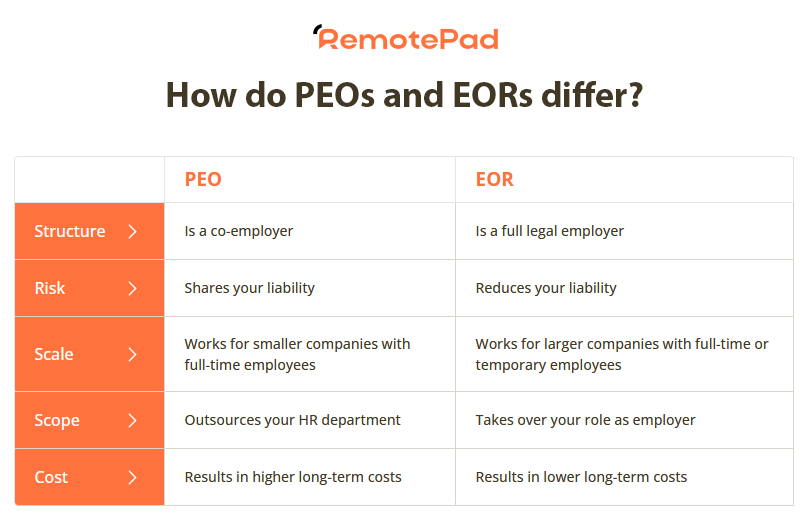Spending too much on recruitment, payroll or global HR?
We help you find the Best Providers at the lowest cost.
Article roundup
- A PEO is a business which offers a range of employment and HR solutions. An EOR is a specific solution where an entity becomes the legal employer of a workforce.
- Most interested businesses can treat a PEO and an EOR in the same way — nearly all PEOs offer EOR solutions.
- It is sometimes said that EORs own and operate through their own legal entities, and PEOs don’t. This is false. PEOs often use their own legal entities.
- Before signing on the dotted line, it is more important that you check which exact services your provider is offering, rather than focusing on the terms ‘EOR’ or ‘PEO’.
If you want to outsource HR and payroll, or wish to hire employees internationally, two terms you will come across are ‘Professional Employer Organization’ (‘PEO’) and ‘Employer of Record’ (‘EOR’). It is an industry growing at a phenomenal rate — the number of employees managed through PEO has been rising at a compounded rate of 8.3 percent annually.
So which one, ‘PEO’ or ‘EOR’ does your business need? And what exactly is the difference between these two forms of HR outsourcing?
Employer of Record — explained
In a standard employment situation, a worker works within an organization for a supervisor. Their ultimate supervisor or boss is often the CEO or Managing Director of the organization. This supervisor is also their employer. This means that not only does that individual direct day-to-day activity, they are also recognized under the law as responsible for that worker and workplace. Legal duties that generally apply to employers in the US include:
- Applying fair labor standards under the Fair Labor Standards Act
- Ensuring employer safety under the Occupational Safety and Health Act
- Withholding and filing employment taxes under the IRS code.
But the supervisor and employer don’t need to be the same person — they don’t even need to be the same company. The supervisory role, and the employment role can be split between two companies. In this co-employment situation, the supervisor is sometimes called the ‘worksite employer’ or ‘operational employer’. The other organization, the legal employer, is called the ‘Employer of Record (EOR)’, and takes on specific legal and compliance responsibilities.
The EOR becomes responsible for filing taxes (both state and federal). And they do so under their own Employer Identification Number (EIN) — a unique tax ID for employers, issued by the IRS. Any errors or non-compliance are the responsibility of the EOR.
In addition to tax obligations, the EOR may also become the legal employer for other purposes. For example, EORs have been recognized as the legal employer for purposes of collective bargaining.
The exact responsibilities of the EOR will depend on the agreement between them and the client/client company, as well as the law that applies in their state or country.
The employer of record could be any individual, entity, organization that meets the statutory requirements for an EOR. It could be a private business, a non-profit, a public body, or even an ordinary/natural person. What matters is that they are registered as required in any locations that they operate.
Professional employer organizations — explained
Professional Employer Organizations are companies that specialize in human resources, payroll, and employment compliance solutions. In nearly every case, as part of this, they offer EOR solutions: They will take on workers as they own employees for tax purposes and file taxes and make the necessary deductions for those employees. Usually, the PEO agrees to become the EOR for other various non-tax purposes as well, such as for insurance and pension schemes.
While a PEO offers EOR solutions, they do not only offer EOR solutions. In addition, they often provide:
- Strategic HR advice and analytics. PEOs provide consulting services to help you get the best out of your people.
- Visa and immigration assistance. If any of your workforce needs visas or work permits ,a PEO can often streamline the process for you.
- Recruitment Services. The PEO sources talent both through advertising, and its own curated networks.
PEO vs EOR: A common misunderstanding
It is sometimes stated that PEOs do not have their own legal entities through which workers can be employed — that this is reserved only for EORs. This is not true. PEOs usually do own their own entities to employ a workforce. In fact, one of the most respected types of PEO, a certified PEO, must file taxes through its own legal entity.
As stated above, the key difference between a PEO and an EOR is that PEO is a broader HR service offering, and EOR is a specific HR solution relating only to employment compliance.
What is the difference between an EOR and a PEO? A full checklist
The reality is, many businesses use the terms ‘Employer of Record’ and ‘Professional Employer Organization’ interchangeably. You could use either organization and receive exactly the same service.
However, there is a distinction, recognized in both law and practice. When considering a provider, we recommend you ask yourself the following questions.
- Does the provider operate internationally? Usually, businesses operating globally use the terms ‘Global PEO’ and ‘International EOR’ interchangeably. There is no reason to expect a different service by choosing a company that uses one label rather than the other.
- Is the provider a company/commercial enterprise? If the answer is no, then the provider is an EOR. An EOR can be a non-profit, public or governmental body. For this reason, an EOR is sometimes known as a ‘fiscal intermediary‘ or ‘public authority‘. If they are a commercial enterprise, then they are likely to be a PEO which offers EOR solutions as part of its business.
- Do they only offer employment compliance services? If yes, they are an EOR. An EOR, by definition, becomes the legal employer of workers on behalf of a client company. A PEO usually provides a lot more than just an EOR solution. They may provide HR strategy, recruitment, and visa support services, for example. In fact, research suggests smaller enterprises can benefit significantly from the additional ‘human capital-enhancing’ services offered by some PEOs.
PEO vs EOR: Advice for Startups
Adam Spector from AbstractOps explains the difference between an Employer of Record (EOR) and a Professional Employer Organization (PEO), and the benefits and risks for startups.
Do you need a PEO or an EOR? — A final word
Often businesses use the terms ‘PEO’ and ‘EOR’ interchangeably in their marketing. There may be no difference in the services provided by a company that uses one term over the other.
The most important thing is to check carefully, both in your initial conversations with the provider, and before you sign a PEO or EOR agreement, that the provider offers the service that you need. Where a company is agreeing to be the EOR, make sure it is stated explicitly which employer responsibilities it is becoming liable for (e.g., will the EOR become the legal employer for employment tax and health insurance purposes, or just tax?).
FAQ
PEO stands for ‘Professional Employer Organization’, while ‘EOR’ stands for “Employer of Record’.
A PEO (Professional Employer Organization) is a company that provides comprehensive HR services, including payroll, benefits administration, and employee management, whereas an EOR (Employer of Record) is a service that solely takes responsibility for the legal and administrative aspects of employing workers.
PEOs and EORs can bring several benefits to businesses. PEOs offer access to economies of scale, allowing small businesses to gain cost-effective access to employee benefits, HR expertise, and compliance support. On the other hand, EORs streamline the administrative burden and ensure compliance by taking care of payroll, tax withholdings, and legal responsibilities, enabling businesses to focus on their core operations.



